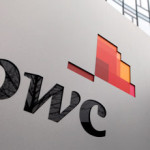PwC Report: Blockchain a ‘Once in a Generation’ Opportunity for Financial Services

Blockchain marks the next “jump” in business process/optimization technology, according to a newly-released PriceWaterhouseCoopers (PwC) report on fintech. The report, “Blurred lines: How FinTech is shaping Financial Services,” compares blockchain to Enterprise Resource Planning (ERP) software that allowed entities and functions within a business to optimize processes by sharing logic and data within the enterprise.
Blockchain, according to the 36-page report, will enable entire industries to optimize business processes by sharing data among organizations that have separate or competing economic objectives. It notes that blockchain combines a number of cryptographic, mathematical and economic principles to maintain a database of market participants without requiring a third party reconciliator or validator.
PwC has partnered with Blockstream to promote distributed ledger technology, CCNrecently reported. PwC has also entered into a partnership with Digital Asset Holdings, another company promoting blockchain.
An Emerging Fintech Technology
The report cites blockchain as one of several fintech technologies that challenges the financial services industry to adapt to a changing marketplace.
While the report covers a variety of fintech trends impacting financial services, it cites blockchain as one of the most promising technologies despite some challenges it faces. The first page of the report highlights the following two findings: more than 20% of financial service (FS) business is at risk to fintechs by 2020; 57% are unsure or unlikely to respond to distributed ledger technology.
The study surveyed 544 respondents, mainly CEOs, CIOs, innovation heads, and top tier managers active in technological transformation. The survey was given to FS leaders in 46 countries.
Blockchain is also cited among the report’s seven key messages: blockchain is an untapped technology rewriting the FS rulebook; fintech is shaping FS from the outside in; fintechs are succeeding where traditional FSs have failed; disintermediation is fintech’s most powerful weapon; over 20% of FSs are at risk to fintechs; fintech is slashing costs; and FS must leverage the fintech ecosystem.
Blockchain’s Challenges
While blockchain shows significant promise, it faces challenges. A widespread understanding of blockchain and its commercial implications requires knowledge of intersecting disparate fields, which points so some uncertainty for blockchain’s potential applications.
In terms of awareness amone survey respondents, blockchain ranked low compared to other fintech trends. When asked how important certain fintech trends are and how likely they are to respond to them, blockchain ranked last among 11 trends. Respondents ranked the trends as follows: 1) self-directed services, 2) usage-based insurance, 3) remote access and data capture, 4) connected/smart car, 5) new models of holistic advice (robo advice), 6) granular risk and/or loss quantification, 7) shift from probabilistic to deterministic model, 8) connected medical and health advances, 9) ride sharing solutions, 10) robotics and automation in core insurance, 11) blockchain.
A 57% majority of respondents expressed uncertainty about responding to blockchain. Eighty-three percent said they are moderately familiar with it while very few considered themselves experts.
Payment and fund transfer institutions were most familiar with blockchain while 30% of these respondents were confident about their knowledge of how the technology works.
A ‘Radically Different’ Future
Blockchain technology could deliver a “radically different” competitive future in the FS industry. There could be a “huge cost savings” from its use in back office operations as well as big gains in transparency that hold promise from a regulatory and audit standpoint.
Smart contracts, contracts that translate into computer programs and can self execute, represent a new area of exploration. Smart contracts bring potential to automate and speed up manual and costly processes, promising huge potential.
Startup innovation in the blockchain sector is frenetic, the report noted. The pace of change is so fast that information can become outdated by the time it goes to press. The PwC Global Blockchain Team has recognized more than 700 companies entering this space. Out of these, 150 are considered worthy of tracking and 25 will emerge as leaders.
Blockchain use cases emerge quickly, the report notes, but they tend to focus on the increased efficiency from eliminating the need for reconciliation among parties, the speed of trade settlement, or revamping existing processes.
The processes cited in these use cases include:
• Improved efficiency in loan servicing and origination.
• Enhanced bank clearing house functions.
• Improved access to securities. A bond that automatically pays coupons to bondholders and other provisions can execute when certain conditions are met without human maintenance.
• Application of smart contracts to Internet of Things (IoT). A car insurance contract embedded in the car itself can change the premium based on the owner’s driving habits. The contract could also contact contracted garages in the event of an accident.
Also read: Digital Asset announces block chain partnerships with Accenture, Broadridge & PwC
‘Once In A Generation’ Opportunity
Distributed ledger technologies offer FS institutions a “once in a generation” opportunity to transform the industry, the report notes.
PwC recommends a proactive approach to determine and respond to blockchain opportunities. It identifies R3CEV, Blockstream and Digital Asset Holdings as startups working to develop business models to accelerate “creative disruption” in financial services.
FS firms should not try to control all parts of their value chain and customer experience through traditional methods but should leverage relationships with customers and their access to client data to move to the center of the fintech ecosystem.
Such an approach will require a shift in purpose and identity. Companies will move away from a linear product push approach to a customer centric one whereby FS providers facilitate a service that allows clients to glean advice and interact with key players through various channels.
FS firms can prepare to play a central role in the new environment where they will operate at the center of customer activity and hold strong positions even while innovations change their market place. While FS companies may not recognize their future industry, they can still be at its center.
Source: Cryptocoinnews





























